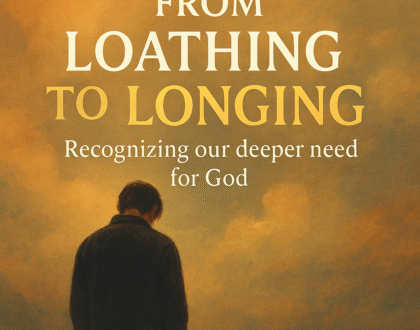Love: The Essence of Sacrifice
From Sunday’s Sermon
Sacrifice is often misunderstood as simply giving up something valuable or enduring loss, but in truth, it is deeply rooted in love. When love is genuine, it naturally leads to sacrifice—not as a transaction or a tally of what we’ve lost, but as an outpouring of affection and commitment. Just as a mother gives up sleep for her children or a husband cares for his ailing wife, true sacrifice is not about obligation but about love that puts another before self. The call of scripture in Hebrews 13 is to let mutual love continue, to practice hospitality, to remember those in prison, to honor marriage, and to resist greed. Each of these acts costs us something—time, comfort, reputation, or resources—but they are the natural fruit of a heart transformed by love.
The ancient world saw sacrifice as a way to appease the gods, to earn favor or avoid wrath. But in Christ, sacrifice is redefined. Jesus’ once-for-all sacrifice means we no longer give to earn God’s love; we give because we are already loved. His love is unending, unconditional, and without expiration. Our acts of sacrifice—whether presence, generosity, or loving the hard-to-love—are not losses but gains, multiplying God’s love in the world. Every handshake, every shared meal, every prayer, every dollar given is a brick in the kingdom of God, a witness to the world of a love that multiplies.
Sacrifice today looks like choosing presence over distraction, generosity over hoarding, and loving those who are difficult to love. These are not mere duties but opportunities to participate in God’s ongoing work. Worship is not confined to Sunday mornings; it is every act of love and service throughout the week. Because Christ’s sacrifice is eternal, our love can be continual, building up the community and reflecting God’s heart. As we share communion, we remember that we are called to share our lives, our resources, and our love—not because we must, but because love compels us. In this way, we become living sacrifices, pleasing to God, and agents of transformation in the world.
Key Scripture
Hebrews 13:1-8, 15-16
Key Takeaways
- Sacrifice is not about loss, but about love.True sacrifice flows from deep affection and commitment, not from a sense of duty or fear. When we love genuinely, we naturally give of ourselves, and this giving is not subtraction but multiplication—expanding the reach of God’s love in the world.
- Christ’s sacrifice redefines our relationship with God.No longer do we offer sacrifices to appease God or earn favor; Jesus’ once-for-all sacrifice means we are already accepted and loved. Our acts of sacrifice are a response to grace, not a prerequisite for it, freeing us to love boldly and generously.
- Sacrifice in daily life means choosing presence over distraction.In a world full of noise and busyness, it is a true act of love to set aside our devices, our work, or our own agendas to be fully present with God and with others. This presence is a gift that communicates value and builds deep relationships.
- Generosity is a form of sacrifice that goes beyond finances.It is about releasing what we hold tightly—our time, energy, attention, and even our smiles—so that others may be blessed. Generosity stretches us, but it also multiplies joy and community, reminding us that all we have is ultimately God’s and meant for sharing.
- Loving the hard-to-love is perhaps the most challenging sacrifice.It means forgiving when it hurts, standing with the suffering even at personal cost, and extending grace to those who may not deserve it. In doing so, we mirror Christ’s love for us, who stood by us even in our guilt, and we become living witnesses to the transforming power of sacrificial love.
Questions for Reflection
The sermon challenges us to see sacrifice as an outpouring of love, not just giving something up. Think of a recent time you sacrificed for someone. Was it motivated by love or by obligation? How did it feel different?
The sermon describes “choosing presence over distraction.” What is one specific distraction (phone, work, TV, etc.) that keeps you from being fully present with God or others? What would it look like to set that aside for someone this week?
Generosity is described as more than just giving money—it’s about sharing time, energy, and even a smile. What is one non-financial way you can be generous this week? Who will you bless with it?
The sermon says loving the hard-to-love is perhaps the most challenging sacrifice. Is there someone in your life who is difficult for you to love right now? What is one way you can extend grace or forgiveness to them this week?
Communion is described as a reminder to share our lives, resources, and love. How can you “share your bread” with someone this week—not just literally, but in a way that reflects Christ’s love?
Recommended Posts

Defying Gravity: Rising Above What Pulls You Down
October 2, 2025

God’s Heartbreak
September 22, 2025

From Loathing to Longing
September 16, 2025
